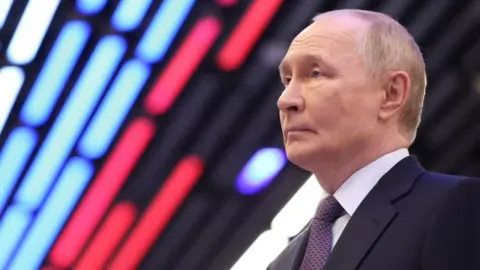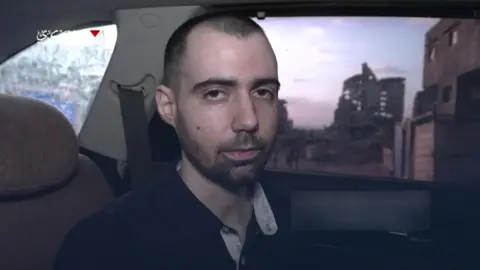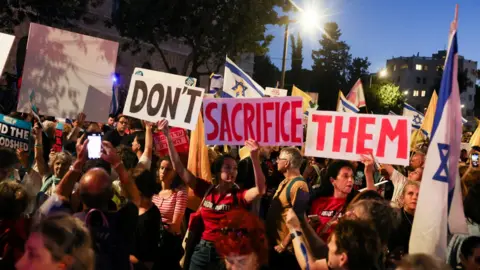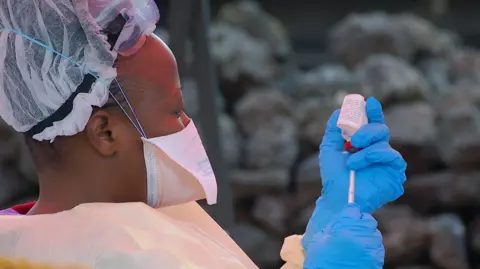In a significant legal development, the treason trial of Joseph Kabila, the former president of the Democratic Republic of Congo (DRC), commenced in a military court located in Kinshasa. Kabila faces a range of allegations, including murder and treason, primarily tied to his purported support of the M23 rebel group that currently controls substantial territory in the mineral-rich eastern part of the country. The ex-president dismisses the accusations, labeling them as unfounded, and notably chose to boycott the initial hearing.
Current DRC President Félix Tshisekedi has accused Kabila of orchestrating the M23's activities, complicating the already tumultuous political landscape. Kabila has characterized the judicial proceedings against him as "arbitrary," claiming that the judicial system is being weaponized as a means of political suppression. Despite a recently forged ceasefire agreement between the government and the insurgents, hostilities have persisted.
After living in self-imposed exile in South Africa for two years, the 53-year-old Kabila returned to Goma, a territory controlled by rebels, in May. The United Nations, in conjunction with various Western nations, has cited compelling evidence suggesting Rwanda's involvement in supporting the M23, claiming it has dispatched troops across the border into the DRC. However, Rwanda has refuted these accusations, emphasizing its intention to prevent the conflict from affecting its own stability.
In May, the DRC's upper house of parliament voted to remove Kabila's lifelong senate immunity, paving the way for his prosecution on charges that encompass treason, murder, instigation of rebellion, and the forced occupation of Goma. Kabila's leadership spanned 18 years after he took power following the assassination of his father, Laurent Kabila, in 2001. He transferred power to Tshisekedi after a contentious 2019 election, though their relationship has since soured.
In recent communications, Kabila expressed his grievances against the government's current administration, denouncing it as a "dictatorship" and highlighting a perceived erosion of democracy. In turn, government spokesperson Patrick Muyaya dismissed Kabila's claims as baseless, stating he has nothing constructive to contribute to the nation.
As the trial unfolds, Ferdinand Kambere, an ally of Kabila formerly associated with his now-dissolved PPRD party, alleged that the government’s approach reflects a double standard, asserting that while it pursues peace actively, it simultaneously seeks to undermine Kabila politically through the judicial process.
Current DRC President Félix Tshisekedi has accused Kabila of orchestrating the M23's activities, complicating the already tumultuous political landscape. Kabila has characterized the judicial proceedings against him as "arbitrary," claiming that the judicial system is being weaponized as a means of political suppression. Despite a recently forged ceasefire agreement between the government and the insurgents, hostilities have persisted.
After living in self-imposed exile in South Africa for two years, the 53-year-old Kabila returned to Goma, a territory controlled by rebels, in May. The United Nations, in conjunction with various Western nations, has cited compelling evidence suggesting Rwanda's involvement in supporting the M23, claiming it has dispatched troops across the border into the DRC. However, Rwanda has refuted these accusations, emphasizing its intention to prevent the conflict from affecting its own stability.
In May, the DRC's upper house of parliament voted to remove Kabila's lifelong senate immunity, paving the way for his prosecution on charges that encompass treason, murder, instigation of rebellion, and the forced occupation of Goma. Kabila's leadership spanned 18 years after he took power following the assassination of his father, Laurent Kabila, in 2001. He transferred power to Tshisekedi after a contentious 2019 election, though their relationship has since soured.
In recent communications, Kabila expressed his grievances against the government's current administration, denouncing it as a "dictatorship" and highlighting a perceived erosion of democracy. In turn, government spokesperson Patrick Muyaya dismissed Kabila's claims as baseless, stating he has nothing constructive to contribute to the nation.
As the trial unfolds, Ferdinand Kambere, an ally of Kabila formerly associated with his now-dissolved PPRD party, alleged that the government’s approach reflects a double standard, asserting that while it pursues peace actively, it simultaneously seeks to undermine Kabila politically through the judicial process.




















